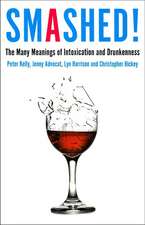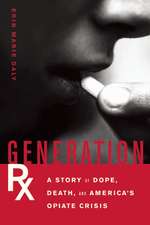Heroin: The Treatment of Addiction in Twentieth-century Britain
Autor Alex Molden Limba Engleză Hardback – 13 apr 2008
Heroin, often viewed as the ‘hardest drug’, looms large in the popular consciousness. Heroin addiction in Britain first began to cause concern during the 1920s, yet while one group of doctors regarded the addiction as a disease which required treatment, other physicians viewed it as a vice which demanded strict control. The medical community and the government have debated both the definition of addiction—medical condition, moral failing or social problem—and the method of dealing with addiction —medical treatment vs. legal controls.
In Heroin, Alex Mold examines the interaction of the different approaches to heroin addiction and argues that the treatment of the addiction as a disease and the control of heroin as a social problem could, in practice, rarely be separated. Treatment became a way of controlling the addiction and the addicts themselves, but debates about the nature of addiction treatment and the methods used resulted in politicisation of the topic. During the late 1960s Drug Dependence Units (DDUs) were established as a means to combine both medical treatment and social control. The ‘British System’ essentially treated addiction as a disease and offered maintenance—the administering of heroin or an opioid substitute on a long-term basis—as treatment. Maintenance proved to be a source of tension between psychiatrists specialising in addiction treatment and private and general practitioners who operated outside the DDUs. This conflict manifested itself in heated disputes on the pages of medical journals, in government committees and in disciplinary hearings before the General Medical Council.
The same debates, conflicts and tensions which have beset drug addiction treatment since the beginning of the 20th century persist today. Despite international laws and codes concerning addiction and treatment, there is much that is peculiar and significant about the British case. Drawing on government papers, private archival collections, medical journals, oral history sources and official reports, Mold presents the first detailed historical analysis on the subject. Historians, sociologists, addiction specialists and contemporary policy-makers can look to this groundbreaking study to learn from the past and shape the future response to heroin addiction.
In Heroin, Alex Mold examines the interaction of the different approaches to heroin addiction and argues that the treatment of the addiction as a disease and the control of heroin as a social problem could, in practice, rarely be separated. Treatment became a way of controlling the addiction and the addicts themselves, but debates about the nature of addiction treatment and the methods used resulted in politicisation of the topic. During the late 1960s Drug Dependence Units (DDUs) were established as a means to combine both medical treatment and social control. The ‘British System’ essentially treated addiction as a disease and offered maintenance—the administering of heroin or an opioid substitute on a long-term basis—as treatment. Maintenance proved to be a source of tension between psychiatrists specialising in addiction treatment and private and general practitioners who operated outside the DDUs. This conflict manifested itself in heated disputes on the pages of medical journals, in government committees and in disciplinary hearings before the General Medical Council.
The same debates, conflicts and tensions which have beset drug addiction treatment since the beginning of the 20th century persist today. Despite international laws and codes concerning addiction and treatment, there is much that is peculiar and significant about the British case. Drawing on government papers, private archival collections, medical journals, oral history sources and official reports, Mold presents the first detailed historical analysis on the subject. Historians, sociologists, addiction specialists and contemporary policy-makers can look to this groundbreaking study to learn from the past and shape the future response to heroin addiction.
Preț: 440.25 lei
Nou
Puncte Express: 660
Preț estimativ în valută:
84.26€ • 90.96$ • 70.65£
84.26€ • 90.96$ • 70.65£
Carte tipărită la comandă
Livrare economică 18 aprilie-02 mai
Preluare comenzi: 021 569.72.76
Specificații
ISBN-13: 9780875803869
ISBN-10: 0875803865
Pagini: 246
Dimensiuni: 152 x 229 x 23 mm
Greutate: 0.52 kg
Ediția:1
Editura: Northern Illinois University Press
Colecția Northern Illinois University Press
ISBN-10: 0875803865
Pagini: 246
Dimensiuni: 152 x 229 x 23 mm
Greutate: 0.52 kg
Ediția:1
Editura: Northern Illinois University Press
Colecția Northern Illinois University Press
Recenzii
“The most detailed history of a national approach to addiction treatment…. In its focus on treatment systems this study is innovative and clear-sighted.”—James Mills, University of Strathclyde
“A strong contribution to our understanding of the treatment of addiction. Not only a good work of history, but also one which should usefully inform policy discussion and analysis.”—Caroline Acker, Carnegie Mellon University
“A strong contribution to our understanding of the treatment of addiction. Not only a good work of history, but also one which should usefully inform policy discussion and analysis.”—Caroline Acker, Carnegie Mellon University
Notă biografică
Alex Mold is Lecturer in History at the Centre for History in Public Health, London School of Hygiene and Tropical Medicine.
Cuprins
Table of Contents
Acknowledgments Introduction
1. Treatment and Control: The `British System', 1916–1961
2. The New Addicts and the Establishment of the Drug Dependence Units, 1962–1968
3. Psychiatry and the Treatment of Heroin Addiction, 1969–1979
4. The Heroin Explosion and the Re-intervention of the Generalist, 1980–1987
5. Disputed Territory: The Treatment of Heroin Addiction in Private Practice, 1980–1987
6. Disputed Methods: Maintenance and Withdrawal, 1980–1987
7. The Impact of HIV/AIDS on Heroin Addiction Treatment, 1984–1994
8. Treatment Works? Drug Policy and Addiction Treatment Since 1994
Conclusion: The Treatment of Heroin Addiction--Past, Present and Future
List of Abbreviations
Notes
Works Cited
Index
1. Treatment and Control: The `British System', 1916–1961
2. The New Addicts and the Establishment of the Drug Dependence Units, 1962–1968
3. Psychiatry and the Treatment of Heroin Addiction, 1969–1979
4. The Heroin Explosion and the Re-intervention of the Generalist, 1980–1987
5. Disputed Territory: The Treatment of Heroin Addiction in Private Practice, 1980–1987
6. Disputed Methods: Maintenance and Withdrawal, 1980–1987
7. The Impact of HIV/AIDS on Heroin Addiction Treatment, 1984–1994
8. Treatment Works? Drug Policy and Addiction Treatment Since 1994
Conclusion: The Treatment of Heroin Addiction--Past, Present and Future
List of Abbreviations
Notes
Works Cited
Index
Descriere
Heroin, often viewed as the ‘hardest drug’, looms large in the popular consciousness. Heroin addiction in Britain first began to cause concern during the 1920s, yet while one group of doctors regarded the addiction as a disease which required treatment, other physicians viewed it as a vice which demanded strict control. The medical community and the government have debated both the definition of addiction—medical condition, moral failing or social problem—and the method of dealing with addiction —medical treatment vs. legal controls.
In Heroin, Alex Mold examines the interaction of the different approaches to heroin addiction and argues that the treatment of the addiction as a disease and the control of heroin as a social problem could, in practice, rarely be separated. Treatment became a way of controlling the addiction and the addicts themselves, but debates about the nature of addiction treatment and the methods used resulted in politicisation of the topic. During the late 1960s Drug Dependence Units (DDUs) were established as a means to combine both medical treatment and social control. The ‘British System’ essentially treated addiction as a disease and offered maintenance—the administering of heroin or an opioid substitute on a long-term basis—as treatment. Maintenance proved to be a source of tension between psychiatrists specialising in addiction treatment and private and general practitioners who operated outside the DDUs. This conflict manifested itself in heated disputes on the pages of medical journals, in government committees and in disciplinary hearings before the General Medical Council.
The same debates, conflicts and tensions which have beset drug addiction treatment since the beginning of the 20th century persist today. Despite international laws and codes concerning addiction and treatment, there is much that is peculiar and significant about the British case. Drawing on government papers, private archival collections, medical journals, oral history sources and official reports, Mold presents the first detailed historical analysis on the subject. Historians, sociologists, addiction specialists and contemporary policy-makers can look to this groundbreaking study to learn from the past and shape the future response to heroin addiction.
In Heroin, Alex Mold examines the interaction of the different approaches to heroin addiction and argues that the treatment of the addiction as a disease and the control of heroin as a social problem could, in practice, rarely be separated. Treatment became a way of controlling the addiction and the addicts themselves, but debates about the nature of addiction treatment and the methods used resulted in politicisation of the topic. During the late 1960s Drug Dependence Units (DDUs) were established as a means to combine both medical treatment and social control. The ‘British System’ essentially treated addiction as a disease and offered maintenance—the administering of heroin or an opioid substitute on a long-term basis—as treatment. Maintenance proved to be a source of tension between psychiatrists specialising in addiction treatment and private and general practitioners who operated outside the DDUs. This conflict manifested itself in heated disputes on the pages of medical journals, in government committees and in disciplinary hearings before the General Medical Council.
The same debates, conflicts and tensions which have beset drug addiction treatment since the beginning of the 20th century persist today. Despite international laws and codes concerning addiction and treatment, there is much that is peculiar and significant about the British case. Drawing on government papers, private archival collections, medical journals, oral history sources and official reports, Mold presents the first detailed historical analysis on the subject. Historians, sociologists, addiction specialists and contemporary policy-makers can look to this groundbreaking study to learn from the past and shape the future response to heroin addiction.








